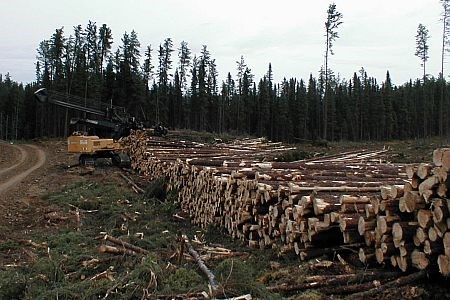TORONTO - At this time there are at least 650 vacant positions waiting to be filled within the forest industry in Ontario.
The Ontario Forest Industries Association (OFIA) has been surveying its members, and by late March, even before all responses were received, that was the number that was registering.
The OFIA and Forests Ontario have been actively pursuing strategies to recruit and develop manpower to meet the needs of the industry.
OFIA Operations and Membership Services Co-ordinator Lauren McBride commented in a telephone interview that intense efforts are being made to find solutions.
OFIA and Forests Ontario have members across Ontario including local operators Georgia Pacific, Interfor (Elk Lake), and Temagami Forest Management Corporation who have recently formed a human resources board.
In 2022 work had been taking place under the name of Bridging the Gap, examining what is needed to develop a workforce for the forest industry.
Three reports are now available on the websites of Forests Ontario and on It Takes a Forest, McBride stated.
"The overview of it is that industries across Canada are seeing a large portion of their workforce retire without the ability to replace them, and the forestry sector is no exception. In Ontario the forestry sector is experiencing a labour force and skill shortage that is preventing the sector from realizing its full economic potential, and if we leave this unchecked the shortage could negatively impact the socio-economic standings of hundreds of communities across the province for years to come," she said.
As part of the solution, efforts have been made to reach out to all Ontario colleges and universities that offer forestry curriculum, she continued.
"The purpose of those calls is to see how we can support the universities and colleges on enrolment and program development," she said.
Another strategy has been to attract foreign workers. McBride stated that one of the OFIA members in Thunder Bay currently has 30 Ukrainian employees and has been working hard on attracting them and others.
The forest industry aligns with the interests of young people whose families have worked in the forest industry, and with young Indigenous people who see the career align with their values, enjoyment of working in the outdoors, and who also recognize the benefit to their communities, she also noted.
She said the more awareness the industry can provide about what it is doing, "the more knowledge we're able to provide on just how effective management of the forest can be for the full health of the forests, their landscapes, and the wildlife that live in the forest. Forestry can be a very positive, social, economic and environmental aspect."
A variety of positions are open in the forest industry including woodlands, mills and hauling operations, she said.
"Trucking right now is a primary issue. Recruiting drivers is extremely challenging. The cost of licensing, training, insurance of new and experienced drives is a significant barrier. This is especially frustrating when experienced foreign drivers are coming to Ontario ready to work but Ontario doesn't offer skill recognition on licensing."
She said this problem is one that human resources groups have been working hard on resolving.
Darlene Wroe is a Local Journalism Reporter with the Temiskaming Speaker. LJI is funded by the Government of Canada.



